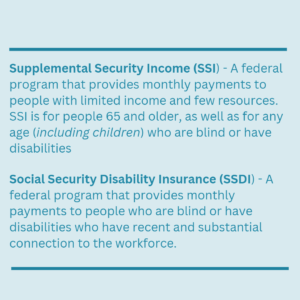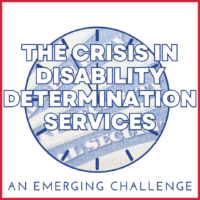The Crisis in Disability Determination Services
Imagine waiting for months, or even years, to learn whether you will ever have enough money for food and shelter. Many people with disabilities and older adults face this harsh reality as they try to navigate the disability process. With long wait times at disability determination offices across the United States, thousands of people are left in limbo, struggling to make ends meet and access the care they need. The impact of these wa it times goes far beyond just delayed benefits – it affects people’s health, housing, and overall quality of life.
it times goes far beyond just delayed benefits – it affects people’s health, housing, and overall quality of life.
For people with severe disabilities that prevent them from being able to work, the Social Security Administration (SSA) administers the SSI and SSDI programs. SSI/SSDI provides monthly income support. SSA contracts with states to determine who meets the disability criteria. In Illinois, the state agency that does so is the Department of Rehabilitation’s Disability Determination Services (DDS). The SSA funds DDS to make objective decisions on disability claims by following Social Security rules and guidelines using disability examiners and professional medical consultants.
The Human Crisis:
At Legal Council, we see how this process is working for our clients right now. Our Homeless Outreach Project (HOP) recently represented Mr. C, a 54-year-old man with a progressive neurological condition that severely limits his ability to walk and speak. Mr. C applied for disability benefits and waited and waited and waited for a decision. While he waited for what would be an eventual grant of benefits, 7 months after his application, he lost access to transitional housing and became homeless—couch surfing to avoid sleeping on the streets. Unfortunately, Mr. C’s situation is not unique. With increasing backlogs and long wait times for decisions, many individuals like him lose access to shelter, medical care, and any semblance of stability in the face of serious illness.
What is at the root of this crisis?
Staffing at SSA and DDS
Since 2010, SSA has seen its customer service budget cut by 17% despite serving 22% more beneficiaries.[1] Illinois has seen particularly steep staff declines at SSA and DDS since 2010: Illinois staffing at SSA is down 20%, while Illinois DDS staff is down 35%.[2] Fewer staff serving more people inevitably leads to poor customer service and long wait times. This problem has put people with disabilities and older adults at-risk of struggling to afford basic needs like food and housing, as they face increasingly long waits for appointments to file claims at SSA offices and for decisions on those claims from DDS.
Data shared by the National Council of Disability Determination Directors confirms that while key metrics are worsening nationwide, Illinois’ DDS faces particularly acute challenges. When comparing the fiscal year 2021 to the average of the previous four fiscal years (2017-2020), Illinois’ existing challenges have reached crisis levels: Illinois’ staff attrition rate increased from 15.6% to 33.9%. As a result, caseloads in Illinois have increased from 180 to 199 claims per examiner, DDS closed fewer than half of the claims they did in each of the previous four years, and the mean case processing time increased from 124 to 200 days.
In fact, Illinois is now ranked 8th from the bottom (44 out of 52 examined US states & territories), with only Oregon, Nevada, Delaware, Washington, Alaska, New Mexico, and Tennessee having longer average processing times for their disability decisions. [3]
As the above data demonstrates, the COVID pandemic has not been the only reason for the delays within Social Security or the current crisis plaguing the agency. One of the most complex issues has been the ability to keep experienced employees. The staffing crisis and consistent budget reductions to the agency have forced the SSA to operate with a fraction of its former staff. This problem compounds itself as the heavy caseloads continually fall on already overworked disability examiners, dragging out the decision process. SSA and DDS struggle to replace these examiners as employees leave for more financially rewarding, less stressful careers.[4]
Challenges with Office Access:
When local SSA offices first re-opened in April 2022, the Social Security Administration chose to limit publicizing that their offices were open for fear of facing large crowds. The Washington Post reported that approximately 45% of SSA’s employees continue to work from home on any given weekday, even now that offices are open. This means that services are partially or fully limited to prescheduled meetings, making it difficult for applicants, particularly individuals with disabilities or mental illness, to participate. The recent push from SSA for people to use either their phone or the website for requesting information or applying for benefits also comes with its own set of problems:
- The SSA has stopped publicly publishing its local office phone numbers and has routed calls to the national toll-free number, which does not have access to all the internal information available in local offices.
- Despite more people using the website since before the pandemic, fewer people are being assisted now than in person.
- Many individuals with disabilities or older adults struggle to manage Social Security’s online system or endure the long wait times to connect to the national toll-free number.
- Many materials are unavailable online; for example, the 23-page Supplemental Security Income (SSI) application is not online, so the only option is to request an appointment.[5]
It is important to note that despite wait times increasing, there has been a decline in the number of new applications adjudicators have received. According to Social Security’s Office of Audit Report Summary from December 2021, in the 12 months following the pandemic (April 2020-March 2021), there were 15.9% fewer applications than the year before.[6]
Based upon her extensive experience and expertise in the field, Legal Council’s Social Security Specialist Attorney, Amy Marinacci (she/her), expounds on why the DDS wait time delays may have severe repercussions for individuals with disabilities –

Amy Marinacci (she/her), Social Security Specialist Attorney
“It is now taking an average of 200 days for people who apply for Social Security Disability benefits to get a decision,” Marinacci said. “Earlier today, I heard from an advocate at a sister organization that a DDS disability examiner told her it would be eight months before the case was even assigned to a caseworker. It would likely be spring of 2024 before she got a decision. While we understand it has been challenging for SSA and DDS to keep and train new staff to process cases, it is inhumane for people to wait upwards of a year to get an initial decision on their case. These waits are just for the first step of a long process that can require multiple appeals and an additional year or two before ultimately being approved. Congress needs to fund SSA to take and process claims adequately, and SSA needs to prioritize the hiring and training of front-line staff to improve customer service. People deserve much better.“
Shining light onto a crisis is the first step in identifying potential solutions for resolving the most significant problems plaguing the DDS and SSA offices. Many lawmakers have begun to recognize the need for increased funding and are calling for bipartisan solutions to the challenges that lead to lack of access and devastating benefits delays for the over 1 million people in this country that rely on these benefits for their well-being and health. [7]
Advocates Response:
For legal aid providers like us that work on these cases, all these challenges have made it more difficult to provide effective assistance, ultimately limiting the number of new cases that can be accepted and people helped. In response, we have convened over a dozen legal and social service organizations focusing on disability casework to advocate for reforms that will improve the efficiency of SSA and DDS operations in Illinois. Legal Council is also participating in a national advocacy coalition to advance policy reforms to better serve older adults and people with disabilities who rely on SSI and SSDI. We will continue to work to support complete and adequate funding of SSA and DDS and hold them accountable for providing timely and accurate service to the public that relies on them.
More on these efforts to come!
—
[1] “Long Overdue Boost to SSA Funding Would Begin to Improve Service”, Center on Budget and Policy Priorities, available at: https://www.cbpp.org/blog/long-overdue-boost-to-ssa-funding-would-begin-to-improve-service
[2] “Social Security Administration Cuts Hurt Every State,” Center on Budget and Policy Priorities, available at: https://www.cbpp.org/research/social-security/social-security-administration-cuts-hurt-every-state
[3] Letter to Social Security – FY July 2022. National Council of Disability Determination Directors. December 09, 2022. https://federalnewsnetwork.com/wp-content/uploads/2022/12/FY22_July_DDS_Survey.pdf
[4] Id.
[5] Pandemic struggles still affect Social Security, a last lifeline for many. Washington Post. October 07, 2022. https://www.washingtonpost.com/politics/2022/10/07/social-security-pandemic-failures/
[6] Comparing the Social Security Administration’s Disability Determination Services’ Workload Statistics During the COVID-19 Pandemic to Prior Years. Office of the Inspector General Social Security Administration. December 01, 202. https://www.oversight.gov/sites/default/files/oig-reports/SSA/01-21-51038.pdf
[7] Lawmakers decry massive backlog in Social Security disability claims. Washington Post. December 07, 2022. https://www.washingtonpost.com/politics/2022/12/07/social-security-claims-backlog-lawmakers-response/


